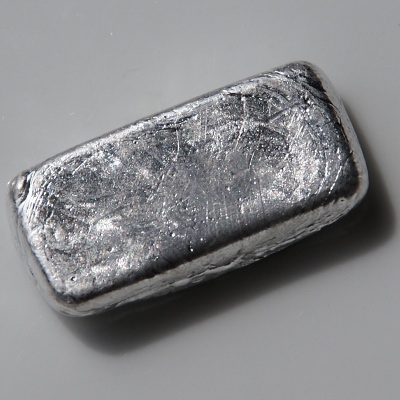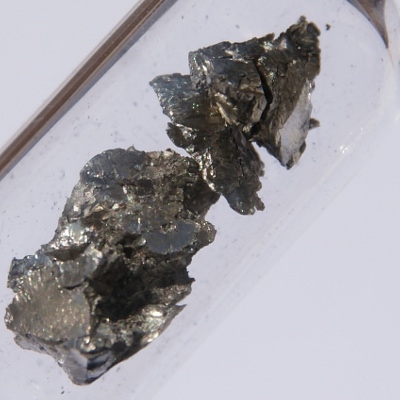Periodic Table Element Comparison: Compare Elements - Indium vs Praseodymium
Compare Indium and Praseodymium on the basis of their properties, attributes and periodic table facts. Compare elements on more than 90 properties. All the elements of similar categories show a lot of similarities and differences in their chemical, atomic, physical properties and uses. These similarities and dissimilarities should be known while we study periodic table elements. You can study the detailed comparison between Indium vs Praseodymium with most reliable information about their properties, attributes, facts, uses etc. You can compare In vs Pr on more than 90 properties like electronegativity , oxidation state, atomic shells, orbital structure, Electronaffinity, physical states, electrical conductivity and many more. Indium and Praseodymium comparison table on more than 90 properties.
Indium and Praseodymium Comparison
Facts
| Name | Indium | Praseodymium |
|---|---|---|
| Atomic Number | 49 | 59 |
| Atomic Symbol | In | Pr |
| Atomic Weight | 114.818 | 140.90765 |
| Phase at STP | Solid | Solid |
| Color | Silver | Silver |
| Metallic Classification | Post Transition Metal | Lanthanide |
| Group in Periodic Table | group 13 | group - |
| Group Name | boron family | |
| Period in Periodic Table | period 5 | period 6 |
| Block in Periodic Table | p -block | f -block |
| Electronic Configuration | [Kr] 4d10 5s2 5p1 | [Xe] 4f3 6s2 |
| Electronic Shell Structure (Electrons per shell) | 2, 8, 18, 18, 3 | 2, 8, 18, 21, 8, 2 |
| Melting Point | 429.75 K | 1204 K |
| Boiling Point | 2345 K | 3563 K |
| CAS Number | CAS7440-74-6 | CAS7440-10-0 |
| Neighborhood Elements | Neighborhood Elements of Indium | Neighborhood Elements of Praseodymium |
History
| Parameter | Indium | Praseodymium |
|---|---|---|
| History | The element Indium was discovered by F. Reich and T. Richter in year 1863 in Germany. Indium derived its name from indigo. | The element Praseodymium was discovered by C. A. von Welsbach in year 1885 in Austria. Praseodymium derived its name from the Greek praseios didymos meaning 'green twin'. |
| Discovery | F. Reich and T. Richter (1863) | C. A. von Welsbach (1885) |
| Isolated | T. Richter (1867) | () |
Presence: Abundance in Nature and Around Us
Parts per billion (ppb) by weight / by atoms (1ppb =10^-7 %)
| Property | Indium | Praseodymium |
|---|---|---|
| Abundance in Universe | 0.3 / 0.003 | 2 / 0.02 |
| Abundance in Sun | 4 / 0.04 | 1 / 0.005 |
| Abundance in Meteorites | 45 / 10 | 100 / 10 |
| Abundance in Earth's Crust | 160 / 30 | 8700 / 1300 |
| Abundance in Oceans | 0.0001 / 0.000005 | 0.0006 / 0.000026 |
| Abundance in Humans | - / - | - / - |
Crystal Structure and Atomic Structure
| Property | Indium | Praseodymium |
|---|---|---|
| Atomic Volume | 15.707 cm3/mol | 20.8 cm3/mol |
| Atomic Radius | 156 pm | 247 pm |
| Covalent Radius | 144 pm | - |
| Van der Waals Radius | 193 pm | - |
Atomic Spectrum - Spectral Lines | ||
| Emission Spectrum |  |  |
| Absorption Spectrum |  |  |
| Lattice Constant | 325.23, 325.23, 494.61 pm | 367.25, 367.25, 1183.54 pm |
| Lattice Angle | π/2, π/2, π/2 | π/2, π/2, 2 π/3 |
| Space Group Name | I4/mmm | P63/mmc |
| Space Group Number | 139 | 194 |
| Crystal Structure | Centered Tetragonal  | Simple Hexagonal 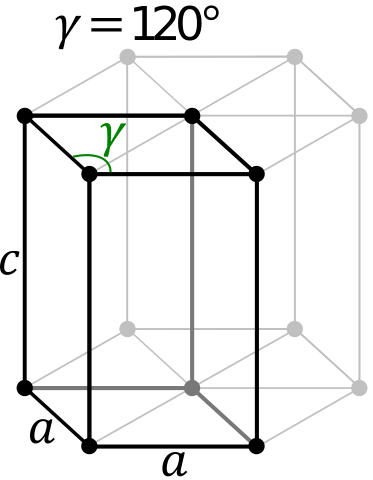 |
Atomic and Orbital Properties
| Property | Indium | Praseodymium |
|---|---|---|
| Atomic Number | 49 | 59 |
| Number of Electrons (with no charge) | 49 | 59 |
| Number of Protons | 49 | 59 |
| Mass Number | 114.818 | 140.90765 |
| Number of Neutrons | 66 | 82 |
| Shell structure (Electrons per energy level) | 2, 8, 18, 18, 3 | 2, 8, 18, 21, 8, 2 |
| Electron Configuration | [Kr] 4d10 5s2 5p1 | [Xe] 4f3 6s2 |
| Valence Electrons | 5s2 5p1 | 4f3 6s2 |
| Oxidation State | 3 | 3 |
| Atomic Term Symbol (Quantum Numbers) | 2P1/2 | 4I9/2 |
| Shell structure | 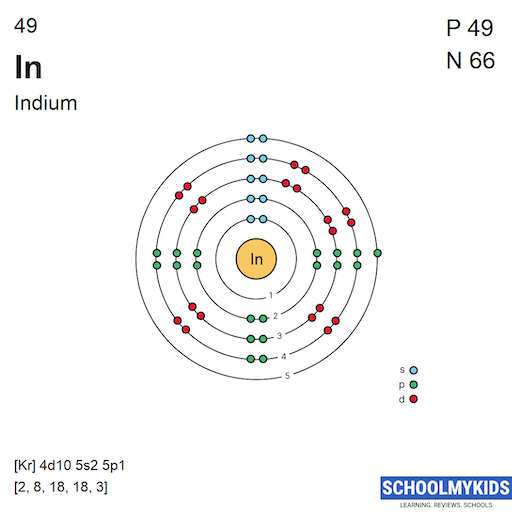 | 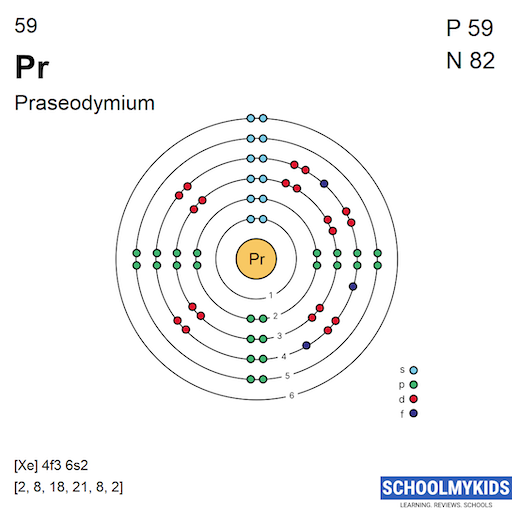 |
Isotopes and Nuclear Properties
Indium has 1 stable naturally occuring isotopes while Praseodymium has 1 stable naturally occuring isotopes.
| Parameter | Indium | Praseodymium |
|---|---|---|
| Known Isotopes | 97In, 98In, 99In, 100In, 101In, 102In, 103In, 104In, 105In, 106In, 107In, 108In, 109In, 110In, 111In, 112In, 113In, 114In, 115In, 116In, 117In, 118In, 119In, 120In, 121In, 122In, 123In, 124In, 125In, 126In, 127In, 128In, 129In, 130In, 131In, 132In, 133In, 134In, 135In | 121Pr, 122Pr, 123Pr, 124Pr, 125Pr, 126Pr, 127Pr, 128Pr, 129Pr, 130Pr, 131Pr, 132Pr, 133Pr, 134Pr, 135Pr, 136Pr, 137Pr, 138Pr, 139Pr, 140Pr, 141Pr, 142Pr, 143Pr, 144Pr, 145Pr, 146Pr, 147Pr, 148Pr, 149Pr, 150Pr, 151Pr, 152Pr, 153Pr, 154Pr, 155Pr, 156Pr, 157Pr, 158Pr, 159Pr |
| Stable Isotopes | Naturally occurring stable isotopes: 113In | Naturally occurring stable isotopes: 141Pr |
| Neutron Cross Section | 194 | 11.4 |
| Neutron Mass Absorption | 0.06 | 0.0029 |
Chemical Properties: Ionization Energies and electron affinity
| Property | Indium | Praseodymium |
|---|---|---|
| Valence or Valency | 3 | 4 |
| Electronegativity | 1.78 Pauling Scale | 1.13 Pauling Scale |
| Electron Affinity | 28.9 kJ/mol | 50 kJ/mol |
| Ionization Energies | 1st: 558.3 kJ/mol 2nd: 1820.7 kJ/mol 3rd: 2704 kJ/mol 4th: 5210 kJ/mol | 1st: 527 kJ/mol 2nd: 1020 kJ/mol 3rd: 2086 kJ/mol 4th: 3761 kJ/mol 5th: 5551 kJ/mol |
Physical Properties
| Property | Indium | Praseodymium |
|---|---|---|
| Density | 7.31 g/cm3 | 6.64 g/cm3 |
| Molar Volume | 15.707 cm3/mol | 20.8 cm3/mol |
Elastic Properties | ||
| Young Modulus | 11 | 37 |
| Shear Modulus | - | 15 GPa |
| Bulk Modulus | - | 29 GPa |
| Poisson Ratio | - | 0.28 |
Hardness - Tests to Measure of Hardness of Element | ||
| Mohs Hardness | 1.2 MPa | - |
| Vickers Hardness | - | 400 MPa |
| Brinell Hardness | 8.83 MPa | 481 MPa |
Electrical Properties | ||
| Electrical Conductivity | 12000000 S/m | 1400000 S/m |
| Resistivity | 8e-8 m Ω | 7e-7 m Ω |
| Superconducting Point | 3.41 | - |
Heat and Conduction Properties | ||
| Thermal Conductivity | 82 W/(m K) | 13 W/(m K) |
| Thermal Expansion | 0.0000321 /K | 0.0000067 /K |
Magnetic Properties | ||
| Magnetic Type | Diamagnetic | Paramagnetic |
| Curie Point | - | - |
| Mass Magnetic Susceptibility | -1.4e-9 m3/kg | 4.23e-7 m3/kg |
| Molar Magnetic Susceptibility | -1.61e-10 m3/mol | 5.9604e-8 m3/mol |
| Volume Magnetic Susceptibility | -0.0000102 | 0.0028087 |
Optical Properties | ||
| Refractive Index | - | - |
Acoustic Properties | ||
| Speed of Sound | 1215 m/s | 2280 m/s |
Thermal Properties - Enthalpies and thermodynamics
| Property | Indium | Praseodymium |
|---|---|---|
| Melting Point | 429.75 K | 1204 K |
| Boiling Point | 2345 K | 3563 K |
| Critical Temperature | - | - |
| Superconducting Point | 3.41 | - |
Enthalpies | ||
| Heat of Fusion | 3.26 kJ/mol | 6.9 kJ/mol |
| Heat of Vaporization | 230 kJ/mol | 330 kJ/mol |
| Heat of Combustion | - | - |
Regulatory and Health - Health and Safety Parameters and Guidelines
| Parameter | Indium | Praseodymium |
|---|---|---|
| CAS Number | CAS7440-74-6 | CAS7440-10-0 |
| RTECS Number | RTECSNL1050000 | - |
| DOT Hazard Class | 4.1 | - |
| DOT Numbers | 3089 | - |
| EU Number | - | - |
| NFPA Fire Rating | - | - |
| NFPA Health Rating | - | - |
| NFPA Reactivity Rating | - | - |
| NFPA Hazards | - | - |
| AutoIgnition Point | - | - |
| Flashpoint | - | - |
Compare With Other Elements
Compare Indium and Praseodymium with other elements of the periodic table.
